Choose WordPress for business websites (probably)
All businesses should have an up-to-date website
We usually recommend WordPress for business use, and this post will explain why.
Can you think of a single reason why a small business wouldn’t have a website? You can build a basic website in a day or two, and host it for free, which takes the ‘money and time’ excuse out of the equation.
There will be people who prefer to research purchases online who won’t know you exist if you don’t have a website. Others might see you as suspicious or non-established if they can’t find you on the web.
Then we need to consider the standard sales/marketing funnel process that involves multiple touchpoints. Investigating a website is usually one of these steps. FAQs and customer testimonials can be seen and understood in advance, so when your customer contacts you directly or shows up in person, they’ll be closer to a purchasing decision.
Look no further than a WordPress website for business (probably)
We advise all small business owners to use WordPress (.org, not .com) for their websites. It’s a solution that can be extremely easy to set up and configure. A WordPress website can also grow in size depending on technical specifications and business complexity.
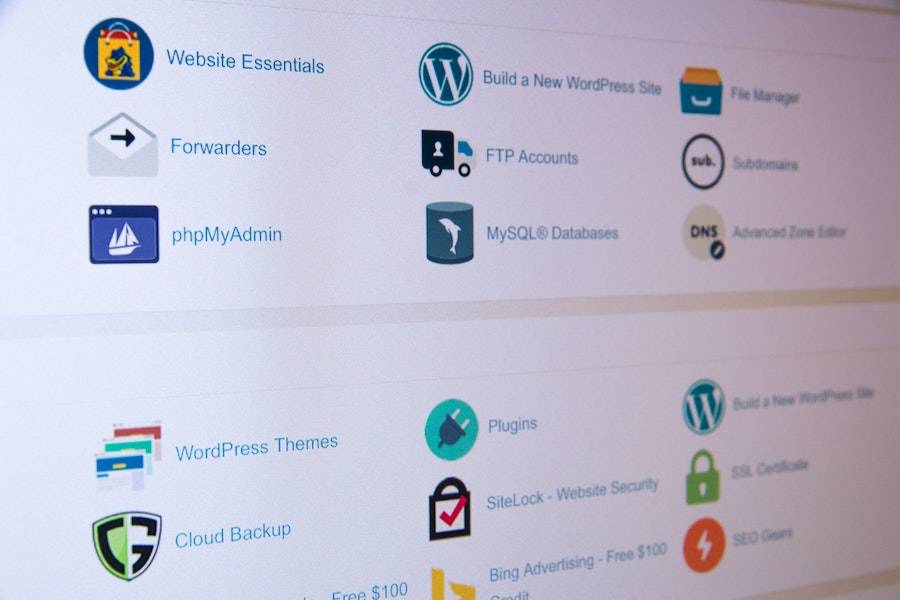
WordPress powers 42.9% of the internet. The software is open-source, and server companies offer one-click installs. There is a free plugin for every imaginable feature that can be uploaded and activated. You can import designs and themes pre-filled with demo content ready to be edited to suit your business.
In addition, the number of help pages, videos, and documents online are vast due to the sheer number of users. Even if a business owner runs into challenges, there are so many people that can help. If you can use PowerPoint, Word or Excel, you can use WordPress.
Switching from a hard-coded website
When clients come to us, they have been using website developers who code everything from scratch most of the time. Sometimes we find people that do it themselves using platforms such as Wix or Squarespace which are quick and easy to use.
The main problem with hard-coded sites is that it costs more time and money for every new feature. Even a straightforward redesign can be a considerable undertaking. On the other extreme, the issue with many of the ‘website in 5 minutes’ type platforms is that they have limited options for customisation and features.
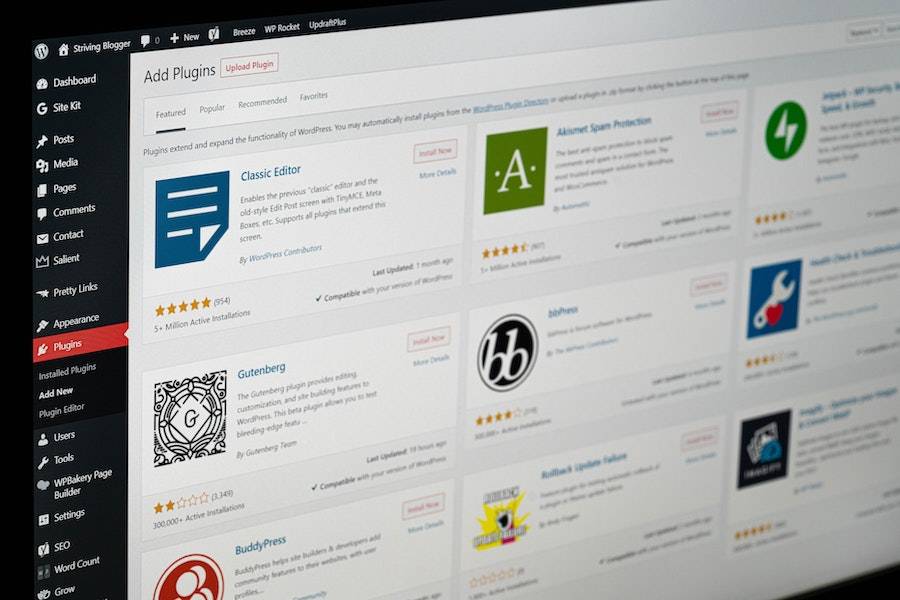
WordPress is the best of both worlds. A free plugin can add new features that could cost thousands in development. The weeks of development and the new bugs are also avoided.
On top of that, WordPress is so popular and well supported that you can probably find more customisation options than with a developer. Any developer you might contact will have strengths and weaknesses. Since there are plugins for everything, there are few weaknesses as the best programmers write the code worldwide.
When is WordPress for business NOT the best solution?
A hard-coded website might be best if your website is unchanged over months and years. WordPress websites need frequent software updates. Someone needs to log in as an administrator and update the WordPress core, themes, and plugins every month or so. These are usually one-click updates, but this still needs to be done, and then occasionally, there might be new settings or configurations required or there could be a plugin conflict or other bug.
WordPress for businesses that need highly custom or unique features can be a blocker. WordPress might not be the best option when you have complex features over and above the standard brochure-type pages, blog posts, etc. Some plugins can add complex features such as job boards, forums or multi-faceted search features.
Still, if you require something unusual, there might not be a plugin to match your requirements. If there is, you still need to consider that regular software updates might cause an issue with the working of your specialised and vital features.

Hard-coded websites still need to be updated to recent software versions. Still, these updates are likely to be required less frequently, perhaps yearly. They will still probably function well enough if left alone for multiple years (although that is not advised).
*These points are general and will be clearer when we look at your specific business requirement. We can ask the most important questions when deciding whether to get the website custom developed or use a content management system (CMS) such as WordPress.
- Are you going to want to make frequent changes and post blogs and other fresh content?
- Will you have complex features that we might customise for your business?
- Do you only need a brochure-type website that’s rarely edited or changed?
These are the types of questions to ask yourself before a new website is scoped.
We usually advise clients to use WordPress to save a significant amount of money but still get a better result. There are exceptions based on what the website needs to do, but a user-friendly CMS is optimal for most companies.
Getting started with your WordPress business website
Our company website runs on WordPress, and we recommend it to all of our digital marketing agency clients.
We’ve learnt that the quality of themes and plugins vary tremendously. Two plugins that solve the same problem might be miles apart regarding clean software code, support and updates, usability, and the learning curve in setting them up. More importantly, some carelessly chosen themes and plugins can later cause terrible problems with your website.
You might find that you’ll lose data and accumulate bugs without even realising. Unfortunately, most backup systems overwrite previous copies every 14-30 days, so you can lose data forever without a deliberate secondary-spaced backup plan.
What are some things we wished we had known when we started?
There are countless WordPress developers in the world. We made one mistake searching for themes, plugins, and custom programmers at face value. For example, one might choose a theme that is most appealing visually. You might choose a plugin with extra features over a simpler version. Choosing between custom developers can be tricky.
Extra due diligence is complex when you know little to nothing about writing code. Choosing solutions without proper research will result in bugs, crashes, lost data, and the ‘white screen of death’ more often than you’d like (never). You can lose whole days or weeks fixing software issues that you could have avoided.
Most people creating a website are making blogs, hobby sites and side gigs. A WordPress website for business requires a much higher level of diligence as sales, enquiries (and complaints) will come through it.
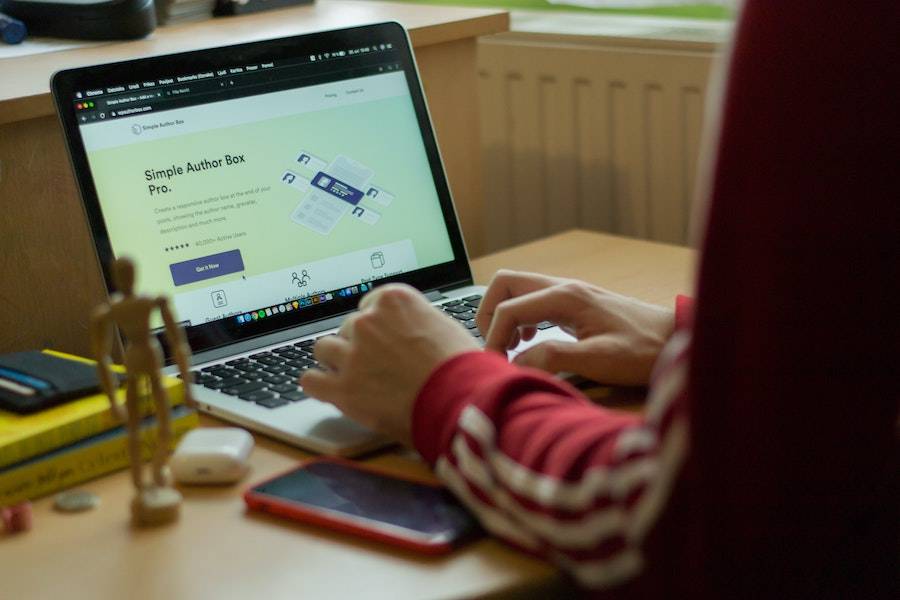
It’s better to spend more time researching and then sticking to a minimum number of quality suppliers. For example, many top WordPress developers build every new website on the market-leading Elementor framework and themes.
It’s unusual for us to veer away from our trusted software providers. We will only do it if a client insists on a template design or features that a different theme provider does better. Due to picking as few reliable theme and plugin suppliers as possible, bugs and crashes are almost non-existent. The same applies to custom developers. Try to pick a reliable choice and stick to it.
The skill of researching and choosing quality is most important. There’s no benefit in having the best in-house plugin developer when we can choose from all of the best software in the WordPress ecosystem.
Being able to differentiate between quality efficiently is essential. There are lots of ways of doing this. For example, we can install SEO analysis browser extensions to take a glance at a developer’s website and see the authority of their domain (the number and quality of backlinks pointing to it).
Ongoing maintenance
As an agency that sells these services, we have an in-house person who takes care of websites for our company. The reason is that this person has plenty of previous experience in running WordPress websites. As a bootstrapped company, it made sense to use an existing skillset. WordPress is so easy to use, it takes little maintenance monthly. We use outside developers for any significant customisation or unique coding.
Whether to outsource fresh content, web design and maintenance should be about the cost for most business owners.
Not the price – the cost!
What’s the time worth of the person who would do it? What’s the opportunity cost? For example, if the business owner does it, is that the best use of their time? Or should they be raising money or pitching new business? If they enjoy writing and posting to a blog, perhaps this is an exciting hobby that gives a break from the everyday demands.
Unless the internal person is competent and enjoys it, you should outsource it in most cases. A WordPress website for business use takes careful planning and consideration, contact us for a free initial consultation, and actionable advice.
Goodbye Oilpro: The Best Oil and Gas Online Community
Goodbye Oilpro: The Best Oil and Gas Online Community
The news about Oilpro closing
So, the website that I visited five days a week, and read at least 20 pages each time was going to close. I’ve quite a few years of experience working online, but only joined the oil and gas business at the start of 2015, a few months into the worst crash in decades. Oilpro.com was my source of information and education. Over the past two years, I practically spent my apprenticeship or the equivalent of an MBA perusing those pages.
I spent a lot of time contributing, asking questions and cracking a few jokes. I felt, and still feel a connection to at least a few hundred people, mostly strangers in ‘real-life’. I never worked for, got paid a penny from, or even met a member of the Oilpro staff.
I got drawn to the community because of the level of engagement and openness. Also, the fact that the articles there were so authentic. Of course, there was some fake news, uninformed opinions, and occasional nastiness, just like in any group of people. There’ll always be an element of nonsense in large groups. At Oilpro, 650,000+ people had signed up.
When I got this email I was shocked:
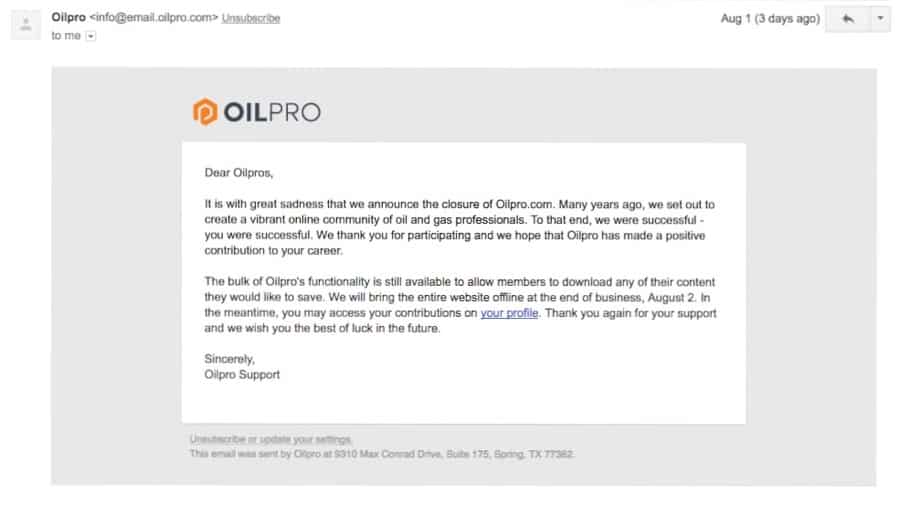
A meritocracy of ideas
While most regular readers and contributors were aware of some legal issues in the background, we still showed up because of the community. I, for one, never expected the whole website to close down.
The thing that I liked most about this oil and gas social media community website is the fact that anyone could post without permission. There were no gatekeepers. Unlike generic social media channels, where the posts got lost in the ‘feed’, or the ‘stream’, each day there were a set number of alerts that would go out in an email. This system meant that each day, thousands of peers would review the post.
If you weren’t sure of the accuracy of the ideas during the post, you probably were by the end of the comments section. The forum had its faults but will be missed by me.
The blog post that helped get me the Community Moderator position
Before the Oilpro.com website closed down, I had a chance to go and cut and paste some of my old posts. I intend to re-publish them online over time. The following section is the blog post that triggered an offer of a moderator position at Oilpro, posted here for posterity, and in fond remembrance of my year as an Oilpro moderator.
Journalists Vs Experts
Introduction:
This draft was written a few months ago after reading some comments where a clear expert got criticized for mistakes in their grammar, spelling or punctuation. I felt strongly that experts with average English skills but insightful knowledge and critical thought skills were more worth reading than someone with only honed writing skills.
Then recently, the topic came up again in one of Arthur Berman’s updates titled ‘The Brain-Dead State Of Oil-Market Commentary’.
I was still reluctant to publish this article because while I have a strong opinion on the subject, I’m not an expert or a journalist. People might think – What the hell do I know?
Then the topic came up again in the comments of this post that I read yesterday:
http://oilpro.com/gallery/1342/17324/top-mover-week-ziggy-moroz
In the comments, some of my favourite writers here at Oilpro commented that their posts were not getting any views. While censorship was suspected, I think that David Kent was sincere in that the email newsletter syndication had gotten overlooked by new staff.
While Jeff was a good writer, and Joseph was probably irreplaceable, I expect that Jess and Jonathan will do just fine as they settle in more.
So, yesterdays comment feed pushed me to get this article published.
(If it was correct about the censorship, then feel free to take this down and never speak of it again. Just don’t boot me out please!)
Journalists Vs experts, and the internet…
It has been a long time since the physical newspaper industry started to struggle. Why? The internet of course, why page through a newspaper looking for a nugget of interesting information when you can do a quick internet search for the latest developments about the things that interest you?
For a while, online newspapers dominated, the only challenge that they had was the ability to monetize the page views. Information seems to want to be free on the internet. It might be THE most common online business tactic, for people to give information and advice for free, to build goodwill. This benevolence, in turn, makes reputations and core businesses.
Then came expert blogs and social media…
If you’re a traditional newspaper type journalist, you’re likely required to write a lot, every day.
If you are required to write 10,000-15,000 words per day on multiple topics, how can you keep on top of each industry that you’re covering? You can’t.
How can you keep the quality high? So that every post is your best work? You can’t.
(In my humble opinion of course!)
If you’re a journalist, then you’ll be very good at spelling, grammar, and punctuation. Practice makes perfect. I also imagine that being in a competitive business with robust editors might also help you raise the bar.
Journalists create a volume of good quality (mostly) technically correct articles.
I would prefer to hear from an expert…
Experts get interviewed and quoted by journalists. If I’m interested in a topic, I prefer to go to the person with knowledge. The information will be targeted and in context.
Suffice to say the expert articles are less likely to be as polished as the journalists. They might be a bit wordy or complicated. There might be a few typo’s, repeated words or other errors.
I prefer the raw feedback over the polished, edited version from people who are not experts on the subject matter.
The problem with Blogs and social media…
… Is that anyone can appear to be an expert, a fancy looking website might fool us into thinking that one source is better than another.
Have you seen ‘quotes’ from historical figures about modern technology online? Any published outbursts that are entirely false will tell you that you can’t always believe what you see on the internet!
Doh!
Of course, you can’t. We shouldn’t believe anything that anyone tells us without reserving the right to use our brains to decide the accuracy of it.
The evolution of news
So, getting to my point. We now have the opportunity to post articles freely without the bar to entry that we had before the internet. The whole world can see them.
Even better than that, any expert can post in a place where a panel of peer experts can review the material. These experts can freely post their comments and engage in a debate which is often more valuable than the article itself. (Especially here on Oilpro.com).
We have an open debate among experts, combined with the ability to up-vote, encourage and thank those who are helping us with their experience. We can get to the crux of the matter in a previously impossible way.
We can always improve our writing and communication skills, but this is not necessary as long as we can get our point across. Online expert communities are the future of news dissemination.
Factually incorrect and even stupid comments should get welcomed so that we can hone our skills of critical thought. We can also help those who become mistaken on a matter.
Thanks to everyone here at Oilpro, this article was for you.
Comments (21)
Don M · Aug 24
Thanks for the article, Jason. Although I have my share of typos and outright errors, I am willing to edit the articles of others if they might be afraid to publish due to grammatical errors. If anyone wants me to edit, just publish the article and send me an oilpro message with the link. As a moderator, I can make changes without special permissions from the author.
The expertise on oilpro has probably taught me more about our industry in 1.5 years than I learned in the 25+ years before that time. I would hate to lose more information because someone is hesitant to post due to an unimportant consideration.
Jason Lavis · Aug 25
That’s great Don. This is the reason why I wrote the article, to encourage people who have something valid and potentially valuable to say – to say it. To not be put off by fear of ridicule or the grammar police. I also wanted to send another signal to ‘the management’ that this is what has made Oilpro great and has caused people to quit other oil related forums and websites in droves. By not adding contributor articles to the daily newsletters the good ship Oilpro had started to veer off course.
James D · Aug 25
This one was just too good to pass up …
“ex-pert”
noun
“a person who has a comprehensive and authoritative knowledge of or skill in a particular area.”
To adjust one of the highlighted lines in the article, the problem with ‘experts’ and publishing is at least two-fold:
a). ‘Experts’ view publication as an endorsement or validation of “expertise”, and;
b). It isn’t.
Here’s what I’ve learned about most ‘experts’ … they’re (almost always) has-been drips. And it doesn’t matter how many ‘peer reviews’ that ‘expert’ has pinned to his or her wall.
Jason Lavis · Aug 25
James, I am meaning ‘expert’ in the broad sense of the word, as in having a practical and deep knowledge and experience, versus having little to none. I challenge you to write an article highlighting the different types of experts and the value they bring to the table. (E.g. self-proclaimed Vs recognised, academic Vs practical). Warning: If in this article you refer to yourself as a ‘thought leader’ as some internet experts do, I will un-follow you 🙂
James D · Aug 25
@JasonLavis:
There is no such thing as an “expert” in the ‘broad sense of the word’, either one is, or one isn’t. In the event you’re unaware of the antonyms for the term “expert”, here are just a few: “amateur”, “apprentice”, “environut”, “ignoramus”, “novice”, “rookie”. It should go without needing to be stated, but there are additional not quite so politically correct.
And, without digressing too far, it just so happens that most of those who view themselves as “experts” are, in fact, in amongst those antonyms.
Further, how “you” want to define a term that is already clearly defined, definitely shows a lack of “expertise” in establishing standards for “expert”.
If you want to in-follow me because I refuse to engage in the equivalent of arguing how many Angels can dance on the head of a pin, well that’s not going to disturb my nights’ rest one little bit.
Jason Lavis · Aug 25
@James D:
Just to be clear, I understand and agree with both of your comments. I also have no desire to debate meanings of words and categories, antonyms or synonyms.
My reply to you was intended to be friendly and humorous. I didn’t actually think for a second that you would consider writing an article about different types of experts while referring to yourself as a thought leader. The idea that I would actually suggest that in seriousness (or that you would take it that way) is obvious comedy to me. This is why I also put ‘Warning:’ – as if anyone would seriously warn someone that they might un-follow them.
IF, on the other hand, your comments quoting dictionary definitions, and other English language teachings are also meant in humor, then you are the master of irony and I take my hat off to you. (One of the main points of my article was for us not to be afraid of mistakes in spelling, punctuation etc). If your comments were both meant in humor then you got me twice!
Either way, I wish you well James…
Steve S · Aug 25
Grate artikle. Yur rite.
Arthur H · Aug 25
“”ex-pert”
noun
“a person who has a comprehensive and authoritative knowledge of or skill in a particular area.”
And there lies the problem, in ‘journalism’ for the masses, your ace reporter does NOT hesitate to pass him/herself off as being an “EXPERT ON EVERYTHING”.
Today, they pass themselves off as rocket scientists, yesterday, they were the “go-to experts on man-made global warming”, or in the case of their ‘reporting’ on our business, THEY are the ones who continually describe the oil and gas companies as “drillers”, and refer to “fracking”, as a “drilling technique”. These are same people who come dangerously close to practicing medicine without a license whenever they do a ‘story’ on medicine or medical treatment. I honestly believe that most, if not all of the un-named “experts’ that they quote, are nothing more than them inserting their own opinion into the story, just like they manage to cover their asses by the use of such words as possible, might, maybe, or could, in most of their stories, words which make their ‘story’, nothing more than conjecture, rather than the factual coverage of events. Most of the ‘journalists’ and ‘reporters’ for mass market media are there only because they cannot get a real job, because of their lack of intelligence.
Steve H · Aug 24
Good article Jason. I’ve stopped being overly concerned about grammar errors, and I am sure there will many in this short comment. My daily industry fix is undoubtedly social media blog sites pertinent to the subjects I follow. Journalists are almost always factually incorrect. We see it clearly as subject matter experts, specialists, or even as enthusiastic followers. It must, therefore, be true of most journalistic content. But as with all sites, the content becomes dull and repetitive without a constant stream of new authors, and those like yourself who are new to the industry but fascinated in how it works, and relates to our everyday lives.
Fawzy H · Aug 25
Good argument Dear Jason especially when it comes to a person like me (decedent from Egyptian peasant family). Despite studying Shakespeare and Dickens, English remains a second language. I feel quite comfortable to receive the editorial support from Jess and Jonathon the same as I used to receive from Elizabeth and Jeff. It appears as an Oilpro culture. My first post on Oilpro was edited by Elizabeth and, WOW ! on the added value of the style, the words… Again just yesterday, I made a post and a few hours later Jess came back to remind me to add an introduction. Let’s just go with he basics 1) there is always room for improvement. 2) Team integration improves the results 3) a mediocre initiative is better than nothing.
Jason Lavis · Aug 25
Thanks for commenting Fawzy. You’re right with your three points. With the mindsets of continuous improvement, better teamwork, and more effort, any organization thrives. To use a sports analogy, we move from having a good coach and a star player, to being a world class squad.
Mohammed K · Aug 25
You need to know what you really want, and on the other hand, you need to be open minded critical thought skills were more worth reading. Consider any opportunity even if it is not what you think you want, Not only this help you decide your place, it will also be useful later in your career as you will have a global view on your place in the industry and help you collaborate with various stakeholders.
David K · Aug 25
Jason, You are dead on. You have hit upon the primary reason we invented Oilpro – to give the true experts a voice. The Oilpro Staff would love nothing more than to simply be in charge of assisting the real experts with their content. We are more than happy to help with grammar, spelling, etc. Like writing a book, the author needs an editor to run cleanup. We are happy to do that and have done so in the past.
Do I miss Joseph’s equity research? Absolutely. But we have several equity analysts that are contributing today on Oilpro. There has been a bit of lull with a changing of the guard here at Oilpro but we are getting our feet under us again. Basically, we are still in a place where we have to reach out to our contributors to get their latest and greatest content. It does not always come organically, like your article.
The area of Oilpro that I am hoping that people discover is the Oilpro Q&A, http://oilpro.com/questions
Compare Oilpro’s Q&A to http://stackoverflow.com/ Stackoverflow is a Q&A for software programmers and it is a vibrant community of industry specialists helping each other and sharing knowledge.
Check out this page on the new Oilpro leaderboard for answers, http://oilpro.com/leaderboard/answers. These are Oilpros answering others’ questions and earning reputation points… just like on Stackoverflow… but for the oilfield.
We need help with adding questions as well as finding people to answer those questions. This will be a great resource on topics ranging from drilling engineering to subsea processing to proper mooring techniques to the digital oilfield…. the list goes on.
30,000 people have signed up to Oilpro in the last 30 days. That is basically the entire readership base of many popular O&G magazines acquired in a single month. That puts Oilpro at 650,000 members. Something good is happening but we can always do better, and we will do better.
Jason, Would you like to be an Oilpro Moderator? Once an Oilpro Moderator you will have more tools to moderate, edit, and approve content on Oilpro.
Anyone else interested in becoming a moderator, please email [email protected].
PS – I am sure this very long comment has numerous spelling and grammar mistakes. I don’t get an editor… tears.
Jason Lavis · Aug 25
Thanks, David, I was nervous about hitting the post button for a few reasons. For example I didn’t want to criticize journalists in general, in fact, I hold investigative journalists in high esteem, on par with doctors, teachers or other important roles in society. I also realise, as James pointed out, many ‘experts’ do not deserve the distinction.
I understand and appreciate the “changing of the guard”, and the “lull in contributions” points. If you are running email click analytics you will be able to see that I read multiple articles from every single email newsletter that you publish, so I understand what has been happening this year for your website.
The Q&A forums are an excellent addition, as too are the new leaderboards and point systems in place. In fact, I am only active on two forums online, this one, and one for WordPress Developers: https://premium.wpmudev.org/ The private WordPress forum is exactly the same as stack overflow.
Every single article or long comment online will have perceived mistakes in. I just spelled ‘criticize’ and ‘realize’ with a ‘z’ instead of an ‘s’ which will make some of my fellow Brits spit out their tea in shock and disgust! Those who notice mistakes and miss the message need to get over themselves a little.
Regarding the moderator role, I would be honored!
David K · Aug 25
Check out the homepage of Oilpro. Your article is the lead story. 2nd story is the always insightful, Art Berman’s, “Saudi Permian”… a must read as well.
Dejan S · Aug 25
An “Expert” is paid to solve problems and report data. A “Journalist” is paid to make sense of the “experts” findings to everyone else in words and photos. Journalism is a business with deadlines and is now driven by “shares”, “likes”, “views” = ratings. Journalism has evolved from print sales to digital shares. Journalists rely on experts, and experts sometimes rely on journalists depending on the experts’ agenda.
Jason Lavis · Aug 26
That’s correct Dejan. Now with the internet, the lines are all blurred. For example, a journalist and an expert can both have a personal blog and social media accounts in addition to their company ones. An expert can publish directly on to official news media platforms, without a journalist. Experts often court media attention and journalists seek outreach from experts for example on the Help and Reporter Out website.
Dejan S · Aug 26
@JasonLavis: With the digital platforms, there is a lot of overlap (i.e journalism vs experts). In addition, there are a lot of “citizen” journalism, usually untrained journalists reporting on various news events. The problem here is sources are not checked, biased treatment of data, and little to no code of ethics adhered to. Much of my work is that of a photojournalist for professional cycling events. Sometimes I am asked to put words together for these events. The problem when double dipping is your work becomes diluted on both ends…facts are loose, and photographs are not capturing the whole story, plus you have two different deadlines which tend to be within 2 hrs. I guess what I’m driving at is even though experts can be journalists, “journalists” make for better journalism. Just my take.
David K · Aug 25
Speaking of experts… here is a gentleman drilling wells right now but yet refuses to pump up prices with propaganda. http://oilpro.com/gallery/1378/17841 Thank you Art
Mike Black · Aug 25
Very good post Jason. I like to read my local paper for the local news but for finding facts and seeing both sides of a story you must use the Internet. I think the worst for only telling one side of a story is CNN. They take a story and bring in so-called experts, then beat the story to death, always staying on one side. For example they would make big news saying that the Palestinians had fired a rocket. This is what the American people want to hear, bad, bad Palestinians. They don’t tell you that the Israelis have destroyed 600 Palestinians homes in the last few weeks. Making 800 people homeless, half of them children. They don’t tell you that the Israelis have 414 children in jail for throwing stones. They get 10 years in jail for throwing stones at soldiers and 20 years in jail for throwing stones at a moving vehicle. I am sure if the American people knew exactly how the Palestinians are been treated they would have a change of mind in their blind support for Israel. Don’t get me started about Fox News, they have a complete dislike for the Middle East countries, Muslims and the Clintons. Fox is voting Trump and CNN is voting Clinton. Sorry Jason I have wandered off on another track.
Dejan S · Aug 25
Mike, CNN is about ratings just like big business (oil) in profits generated by sales. More ratings = more advertising sales…..right or wrong, it’s all about business. CNN vs FOX vs TIME vs Newsweek
Jason Lavis
Top DIY SEO Tips from Experienced Marketers
How long do bright ideas last?
For an experienced SEO specialist to discover a real innovation is rare. The word innovation suggests utterly new technology or techniques. What tends to happen in the field of search engine optimisation is that the discovery tends only to be unique to the one discovering it.
SEO Innovation is rare, and even then, rarely shared soon after discovery. As with all secrets, the information leaks slowly, then suddenly all at once. This spike in awareness is thanks to the viral nature of the internet. Once ‘everyone’ knows about a new technique and starts to use it, the effectiveness dwindles since a higher level of competition makes it harder to get to page one.
Then there’s the next consideration, whether the SEO innovation that you are learning about is applicable for your business:
- Some tactics and techniques are potent for a short period but then result in search engine penalties or de-listing.
- Other techniques work well in lower competition niches or local niches but not for a more significant niche or location.
- Some tactics involve a high cost and level of human resources that might not give a satisfactory ROI for you. These same tactics might be golden for plastic surgery, insurance or finance niches.
- Some tactics work well for one industry or location but are pointless for others. There’s no magic SEO bullet that works everywhere and for everyone.
- There are keyword density levels and backlink profiles that will help you rank in one niche, but make your website tank in another.
Did anything that you’ve just read confuse you at all? Perhaps not, but as you dig deeper into the world of SEO, you’ll potentially lose countless hours and get very confused. Often reading about things that you will never take action on, or that would help your business if you did.
You can quickly do some SEO Innovations on a DIY basis
This is the reason for this section of our website. We’ll publish posts about tactics and processes that are likely to be useful to you for your business.
Why do we know this? Because you’re likely to be in the energy industry. Search presence is our specialist area. We know what is expected to work for your website. Our confidence is based on years of extensive SEO experience, as well and almost as many working with clients just like you.
SEO Innovations for energy companies to maximise their online presence. These posts can give you help for your DIY SEO efforts, or you can leave it to us.
Either way, these posts will be explained in as simple terms as possible, and contain references and examples of companies like yours.
This list of innovations will grow over time
When this post was getting written, there weren’t any innovations mentioned at all — just a seed of an idea that would grow. Over the years, this post will get updated with an ever-expanding list of hints and tips. One day there’ll be plenty of SEO innovations that can help you in your online efforts.Most of these suggestions will not be innovations to SEO consultants. They might be innovations for your business, and changes that can easily be made by you, or your company webmaster or IT person.
Click on a box to open it and see the tip:
Check your keywords – Relevance over buzz!
Most business writers tend to include a lot of non-industry related buzzwords to make product or service descriptions more appealing. We want our customers to know that we’re ‘dynamic’, ‘energetic’, ‘professional’, ‘synergistic’ and perhaps ‘leading’ or ‘respected’.The problem here is that search engines will often struggle to identify what you do, and who you do it for if too many generic words get included. Any page, post, or bio needs to have plenty of specific (but varied) keywords in there.The added benefit is that a web surfer or time-constrained visitor can easily see what you do, and for whom you do it. You might have the perfect market solution. If it’s drowned out by phrases such as ‘step-change’ ‘forward-thinking’ or ‘head of its class’, then the visitor might not easily differentiate what you’re offering.
Ask existing clients/customers to help you
By definition, your clients or customers usually aren’t your competition. They’re likely to also appreciate how hard it can be to get noticed online. You should be able to help each other out.
Think of online exposure swaps of similar value. They could write you a testimonial, and you can link to them when publishing it on your website. They could link to one of your articles in their blog, in return for you sharing their services on social media.
You have an area of reach online, and so does everyone you know. Reviews on Google, Trustpilot or on Facebook can help SEO. Any additional citation, review or link can help SEO, and directly lead to click through enquiries. Set aside time for mutual back scratching!
Get more social media exposure even in ‘boring industries’
Over time, we’ve seen plenty of social media trends, and have enough data to view insights. A couple of important observations are that in many industries, companies struggle to get organic growth; and that often, you need to ‘pay to play’ via advertising to gain traction.Did you know that only a fraction of your followers will see your posts on FB if you don’t pay to ‘boost’ them? Did you know that postings get lost in the ‘stream’ like a paper boat?One tip to help organic growth is to realise that in addition to being social media platforms, these websites are search engines too. When you search on LinkedIn or Twitter, you don’t leave the site and go to Google, do you?To leverage these search features, design or re-design your social media pages using keyword-rich text. Including your solution or a searchers question in the URL, description or name of the site can create a steady stream of followers.We created two oil and gas recruitment/jobs pages on FB within a month. A year later, with the same posts, one gained 1000+ followers, and the other has less than 50. That’s 20x the result by including the keyphrase ‘oil and gas jobs’ liberally. These followers came through search!
Give a boost to older content
Rather than thinking of new ideas for your content marketing strategy, see if you can optimise and update what you already published.Go to your Google Search Console, and look at all of your website pages that are on page 2-5 of the search results. Isolate the ones with decent search volumes or buyer intent keywords. Then, check the first-page competition and expand your pages to cover the topic better. Finally, focus your sharing, promoting and link building outreach efforts on these pages, make them into cornerstone content and main traffic drivers. Getting a couple of ‘out of the money’ pages to page one, will be far more successful than adding more pages to 2-5 or the results. Some of your earlier content will be more relevant and prized, worthy of invigoration.
Capture more online real estate
Some SEO hacks don’t involve doing anything to your main company website. When you search for a product or company, how does the first page of Google look? Sometimes we see competitors ranking higher, or even worse. Complaints!A smart business owner will want to capture as many of these top ten spots as possible. The easiest way of doing this is to create company profiles on websites that Google loves.You can create a profile on a few more of the big social media sites. You might think that your company isn’t relevant to Pinterest or Instagram, for example. But, with a bit of creativity, you can take another couple of slots on the top rankings of the search results.Another great idea is to look for business profiles such as the ones on Inc.com or Angel list. Here’s our profile on Angel List!
Hint: you can go there right now and create a couple of profiles!
Create mini niche sites for your products or services
As far as Google and the other search engines are concerned, they might see your main website in a macro sense. For example, you might get identified as ‘oilfield services’ or ‘solar panel retailers’. What are the chances of you getting to page one of a search for related terms? Unless your company name is in a similar class to Weatherford or Amazon, you’ll struggle to rank.If you drop down a few rungs on the ladder, then there are terms for which you can rank. For example, you can niche down to an area or region, or for specific product names or services. You can create new mini-websites that focus on lower competition keywords. These can still supply leads, or refer visitors to your main sales pages.Relevancy is vital in search. A small website with ten pages just about a single product or service will often rank better than a 1000 page website that discusses a wide variety of topics.
Replicate the back link profile of your competition
We all know that dominating the search engines is down to 3 main factors:
- Publishing great content.
- Gaining more high-quality backlinks than your competition.
- Being the biggest/best/most awesome in your niche.
For most SEO practitioners, backlinks are the number one priority.
The types and proportions of websites that link to other sites are different in each sector. Some major news and media outlets link out regardless of industry. But for your niche, there will be an ecosystem of links that your competitors have.
The only ones that matter is the inbound links to your top ten or twenty competitors. You can find these, put them on a spreadsheet, delete duplicates, then have a list of places that you need to build or earn links, to be number one.
The other 10, will have a Venn style crossover, but if you aim to get all of these domains linking to you, then how can you fail?You might have less of a brand footprint. Your company may not be quite remarkable enough yet. Having all of the same links as all your main competition is an unbeatable SEO innovation.How can you find your competitor’ backlinks? The best tool on the market for this is Ahrefs who offer an inexpensive trial.
Photo by Kristopher Roller on Unsplash
Is There an ROI on Social Media for all Companies?
Is There an ROI on Social Media for all Companies?
Tumbleweed marketing?
Many companies have inactive or dormant social media accounts. Sometimes one or two social media channels are so successful; the others get sidelined. When one social media channel takes over, it’s okay since they’re likely operating in a niche where their audience or network has a clear preference for a particular medium.
A professional photographer might find that people love their Pinterest or Instagram accounts, but ignore their Twitter or LinkedIn. That allows for focusing on what the audience wants and makes complete sense. This article isn’t for those companies.
This article is for those who’ve set up social media accounts, that all lie dormant with no posts or followers. That’s the worst scenario, worse than having no social media accounts at all.
That might sound odd, that making an effort to set up the accounts is worse than making no effort at all. The reason is concerning new visitors who don’t know you. If new people visit your empty and lifeless social media account, they’ll see that there’s a lack of interest from your customers. It also shows a lack of effort.
They see something negative, whereas if there were no social media accounts, they would’ve clicked somewhere else.
So, we need to either make some effort, or ignore social media

The problem in ignoring social media is that people are spending more and more time on it. Each new generation is spending increasing amounts of time on their choice of social media channels. That applies to people of all ages.
By not having a social media presence, it’s as if you are opting out on having your storefront on the high street. Instead, you’re choosing to have it in a back alley on the outskirts of ‘internet town’. You’ll be harder to find, as many of your competitors embrace social media and put in the effort.
There are no half measures if you have an eye on the future. You either make an effort or decide to place yourself on a back street, at least as far as new customers are concerned. A raving fan will always find you, but growth may suffer, and the opportunity for relatively cheap marketing will be lost.
What’s the ROI on social media?
That’s a common question and leads to a good point. Perhaps we ‘slave away’ for a couple of hours a day on social media, for what? How many new customers come through our social media postings? The answer depends on who you ask, what business they’re in, and how well they’re executing their social media strategy.
If you’re using paid advertising, and then track purchases or email sign-up rates, an ROI can be determined. If you’re using the unpaid options of posting, commenting and liking, an ROI can be harder to determine.
The same applies to many facets of a business.
What’s the direct ROI on:
- Office cleaning
- Staff team-building exercises
- Ongoing staff training
- Performance-related bonus schemes
- Hiring a public relations company
- Awareness advertising on TV or in Newspapers where there’s no call to action
- Sponsoring the local kids’ football team
- Extra maternity leave or paternity leave for staff
- Staff car parking facility
- A free coffee machine in the staff room
- Additional management training and certification
The list goes on. Unless there’s a specific call to action, or a hotline telephone number designated to a particular marketing scheme, most expenses won’t have a measurable ROI.
There are two crucial questions to ask, however.
How do we want to run our company?
As leaders, founders, or those responsible for sections of a company, we all have a vision of how the business ought to get run. Of course, we want our offices cleaned and our staff to feel clear benefits in working for us. We also want to keep up with the competition, especially in the eyes of our customers.
We want to be ahead of our competition, don’t we? If we’re genuinely rocking it on social media, and our competitors aren’t, it’s hard to imagine a scenario where they’ll overtake us.
This is because:
Social media allows direct access to the upper management in a way that cold calling, direct mail, or showing up at the office doesn’t. If you post a relevant question to the CEO of a company on their company social media page, you’re likely to get a thoughtful response.
Try getting through the bosses gatekeepers on the phone or in person, or try to send a cold email, your chances of a response are slim. This accessibility means that successful companies on social media are closer to their network and audience.
Your target audience can feel the intimacy and will reject competitors who only use the old fashioned communication channels. This closeness and interaction help you keep your finger on the pulse of the industry. You can also get instant feedback on how your company is interacting with it.
What’ll happen if we don’t do it?
- What’ll happen if you don’t clean your office?
- What’ll happen if you decide not to train your staff?
- What’ll happen if you decide to hold onto obsolete technology, when your competition is embracing the new?
Imagine that your company decides to still use fax machines rather than email? What if it determines that the new factory equipment that pays for itself in five years, then increases margins by 20% after that, can wait?
That is what you’re doing if you avoid social media. It’s not that critical for all businesses just yet, but if we extrapolate the trend lines, this is where it’s heading.
Do your companies online and offline messages have integrity?
Do your companies online and offline messages have integrity?
Does your company’s online presence match with its interactions with clients in the ‘real world’?
Does a new visitor to your website get a realistic impression of who you are and what you can do for them?
Some companies who’ve been in business for years seem to see their website or social media accounts as peripheral. They see them in the same way that we might see a side project, somehow separate from everyday business.
In the company head office, the carpets will get vacuumed, the walls neatly painted, and the staff well-dressed. Online, the company website might be old-fashioned, out of date, and with inaccurate or incomplete information. In many cases, sites will malfunction, and be on display, for the world to see.
Is your website even more important than your office?
When someone’s inside your office, there’s a high possibility of them already being customers, or having been referred to you by an existing customer. They’re sold on your product or service already!
Someone coming to your website is less likely to know who you are, so the first impression will be crucial.
Someone browsing online for a company that offers your product or service will click away from a tired, out of date or poor quality site. They’ll keep searching until they find what they want.
They’ll see a competitor who presents themselves online in a professional manner that you display in person. This competitor will get a new client.
It could be that you can offer better value than the competitor. The competitor that you lose business to might even be terrible! They might also be a new start-up company that has no idea and that is destined to fail?
It could be pure luck that they found a good web developer who was able to make them appear more professional and dedicated than you.
The difference in real terms?
- A trail of lost opportunities for new clients, because of the impression your website gave them.
- A portrayal of being second best, in full view of the world.
- A demonstration of a lack of integrity on your part.
- A few thousand pounds or dollars that you could have invested to update your website.
… This trail of lost clients doesn’t just follow behind you on the path that you’ve already walked. It stretches in front of you as far as the eye can see. It continues as long as you stay on this same path.
… The portrayal of being second best, or even being last, would mortify you in ‘real life’. Imagine attending a trade show or presentation and receiving an award for being last. You’d do everything in your power to make sure that it didn’t happen again. Well, I have news for you, the internet IS part of ‘real-life’.
… What’s integrity? Some people think that integrity is doing the right thing or telling the truth. Honesty and morality are friends of integrity, but they are not the same thing. Integrity is where everything pieces together in the best way it can, with no gaps.
Structural integrity does not leak or rattle, and human integrity is where your actions match your values. Business integrity involves you delivering on your value proposition. It also means that your business messages are in sync. You cannot say that you offer the best product or service then have a website that says that you don’t care about your reputation.
… Lastly, modern web design and creating an active online presence doesn’t have to cost a lot of money. If you’re in a competitive market and you want to be number one, then that’s expensive. You might need to spend five or even six figures per month on advertising, SEO, social media management, and so on.
If you’re small to medium-sized established business, and your website is lacking, just spending a few thousand will make a big difference.
It doesn’t have to have custom patented features. It just has to be attractive and informative enough to get your message across to your next client who might not know what you can do for them.
It certainly has to be welcoming enough so that you don’t scare customers away, or demonstrate a lack of business integrity.
If this post resonates with you, and you want to turn away from the path with the trail of lost opportunities, drop us a message, and we’ll see if we can help.
Why a Remote Worker Based Outsourcing Company is Better
Taking advantage of globalisation in your business
There are thousands, in fact, probably hundreds of thousands of companies to which you can outsource your online development. We’ve already covered the benefits of using an industry-specific partner in previous posts.
This post covers the benefits of using a company that doesn’t have an office.
There was a time when all companies had offices. The whole company showed up at the same time every morning. There were layers of bureaucracy, oversight and supervision. (From the bottom of the company to the top). Successful companies all had layers at the top too; Presidents, vice presidents, boards of directors and shareholders, all detached from the front line.
This traditional structure isn’t inherently wrong, and there are benefits gained by these companies such as economies of scale, branding, monopoly positions, and so on.
There’s a problem for you, the customer or the client. All of this needs to get paid for inside the pricing structure of what you are buying.
There are skills needed to create your new website, email auto-responder or sales page. These do not need to be possessed by someone forced to sit in the same office cubicle day-in-day-out. Top copywriters and web designers have been seeing the benefits of working remotely for many years now.
If a red hot copywriter says that he does his best work while sitting in his log cabin in the middle of the forest, that piques my interest.
A web designer might say she gets obsessed with new projects.
If she then says it means 18-hour days in the attic, wearing the same pyjamas. I’d love to see the results.
(Who’s bothered about the dress code? Only software code matters in this example).
You don’t have to be an eccentric oddball to work with us, but it might help
It’s not to say that I prefer non-conformists to work with me at my company. If there’s someone like this, who produces amazing work, that’s OK with me. If it’s at a lower cost than an employee in an office cubicle, why live in the past?
Hiring a company that uses outsourced remote staff has some possible disadvantages. It’s especially the case if the company itself is in another country. If you make a terrible choice, your options are more limited.
It will be hard for you to go to the head office and ask to speak to the CEO or Managing Director. You won’t be able to bang the desk and cause an embarrassing scene to get a response. A legal case, if you are not satisfied, will also be severe if the workers are in a different country to you.
These courses of action tend to be ineffective anyway, even if the company is in the same town as you. If you ever get to the stage that you feel the need to lose your temper or call legal advice, you should realise that you made a terrible choice and wear it.
Pursuing negative, energy-draining courses of action might tie up even more of your valuable time and attention. It might be worth it for a shoddy building, but not a website.
Other than in the situations where things go wrong, I can’t think of any reason why you wouldn’t want to use a remote-based company. Where the company is based or not based should be either a neutral factor or a benefit to you as a client.
11 reasons why having remote staff makes sense
A remote working company has the advantage that:
They can scour the earth for the right person for the job, not just the ones who happen to be available in the local job market at the time of recruiting.
They benefit from low fixed overheads such as not needing offices, pension requirements, worker healthcare schemes, and so on.
They operate in a results-based environment. Where coming in on time, having brief coffee and cigarette breaks or other irrelevant metrics are out of the picture. An outsourced worker gets judged on the quality of their work, and the amount they charge for it.
When you have a developer in one country, a copywriter in another, and a social media manager in a third, they can focus on their work. There are no office politics or negative troublemakers to bring the whole team down.
They’re nimble and can hire according to the workload. There are no problematic downsizing dilemmas or regulatory issues. For example, a staff member is there for a ‘year and a day’ which means that the extra day could cause an unfair dismissal suit.
There are no sexual harassments, bullying, favouritism and office romances to get in the way of work.
The workers can’t join together to undermine a manager or the company itself. They can’t group and create a new company while stealing customer information: no mutinies or power struggles.
Due to the remote nature of the work, there are no company superiors to ask advice. This isolation might seem like a disadvantage, but remote workers tend to be expert at using their problem-solving initiatives. Does that old guy in the corner office know more than Google? No. Remote workers join industry forums and private memberships where they can ask advice from some of the brightest minds in the world, not just the company.
There’s far less awkwardness in hiring and firing, and in starting new client contracts or finishing them. This acceptance is because there’s an understanding that deals and staff come and go. Also, it’s easier because we’re unlikely to bump into anyone that we do business with, in the supermarket.
There are excellent avenues and structures in place for hiring remote staff. If I needed ten new web developers, I could find them quickly. It’s far more straightforward than if I were trying to post adverts in local newspapers and job centres. The same applies to any website development, SEO, content or social media related staff.
Technology workers tend to lead the charge in innovation and the latest solutions. This trend is how virtual based work is moving. Why commute and sit in traffic, to be micromanaged and controlled, and work in a mundane routine, when you can work on your terms? Some of the most creative and resourceful people are making this choice. These pioneers are the ones that are confident and bold enough to go it alone. There are the types of people you want on your project, not office drones.
Update on the 22nd Feb 2017: while this post got written with the subtle intention of putting your mind at rest about the fact that WE operate as a remote/outsourced based business… A reader email indicated to us that you might see the benefit in transitioning your business in the same way. While we use outsourcing as a competitive business advantage, we are certainly not experts. Here is an epic post on the topic by someone more expert than us!
Best Communities for Oil and Gas Workers
Best Communities for Oil and Gas Workers 2023
Do you spend much time on industry-related online communities?
If you’re in the oil and gas business, then the chances are that you belong to some online communities that are specific to our industry. The most popular and common ones are LinkedIn and Facebook groups. There are hundreds of such groups, some are location-based, and some are job-based. Are you aware of the best online oil and gas community for workers?
There are many different reasons for wanting to be part of a good network or community. One of the best features of the internet is that we can all choose who we interact with, and these people can be anywhere in the world.
In the oil and gas business, many of us have had the opportunity to live and work in different countries. Online communities allow us to stay in touch with interesting people that we meet on our travels in a way that was almost impossible before.
Here are a few good reasons for being part of industry-related communities:
- Support
- Social interaction
- A feeling of connection
- A source of knowledge
- A chance to help others
- Career opportunities
- Business opportunities
The last two points are of particular interest to us here at Out of the Box Innovations. The quality of our network can make the difference between success and failure, being employed or unemployed. For us at OOTBI, it relates to having plenty of new business come in as opposed to having to cold call for our next customer.
Two online oil and gas forums are head and shoulders above the competition and are the best use of your time if you work in the oil and gas industry. We only have 24 hours in a day, and our time is precious. Unless you’re spending time on social media and forums as a way of zoning out of life, then it makes sense to get the best leverage for your time.
It could be that you’re the type of person that works hard at their job. Perhaps, the last thing that you want to do is spend time online reading and typing about work-related topics. If that’s the case, then still read on, because one of these recommended websites is suitable for use purely for work. It’s likely to help you solve work-related problems and challenges quickly and efficiently. There’s a way of consulting with some of the most experienced minds in the world, free of charge.

Historically, these have been the best places for oil and gas workers to get information and network:
The majority of websites that’ll be of interest to those in the oil and gas industry fall into a few categories:
Company websites
These have contact information, product specifications, guides, press releases and perhaps a few resources. They’re not usually places that have you wanting to come back for more. On average, there’s not much that could get described as overly interesting, lively or particularly informative. They do their job though, and if you’re looking for any particular product or service, you can find out about the companies who supply it.
News websites
We get our news from a variety of sources depending on the way that we like to digest it. There tend to be tiers of accuracy, quality, and purity of information. There are only so many actual industry events in a given week, and they tend to get covered by the mainstream media first.
Then, this same news is written about by bloggers, industry experts, and then the majority is ‘cut and paste’ type regurgitated stories. At the bottom of the pile, you get inaccurate and misleading news articles that are written simply for clicks or shares.
If you see headlines such as:
Saudi Arabia is about to destroy the US oil industry completely
The oil industry is about to add a million jobs
Oil is about to spike back to $100 for this black swan reason
Then don’t complain when your eyes are insulted by a load of low brow nonsense.
There’s nothing on ‘crudeoilnewsandgossip.com’ that you won’t see on Reuters or CNN first.
Generic Social Media Channels
We all have our favourite social media channels. There are larger communities of oil and gas workers on Facebook, LinkedIn, and Twitter. Here we can see whatever we want in our news stream. Some people have a preference for mixing their industry news with sports results, soft porn or whining and complaining.
Those who are good at blocking, unfollowing and pruning their stream will get the best results from social media. A skilled practitioner can get much of what they need from the previously mentioned social media channels. There’s a tendency for LinkedIn to be a little recruiting biased, and Facebook to be a more tabloid type read. Twitter has an art to it that can be very rewarding for those who master it.
Do you want real information, that’s industry-specific and can help answer questions and solve problems? Then you ought to be spending time on our following two recommended websites though.
STOP PRESS! Our first recommendation of Oilpro is no longer in existence. This following section and the rest of the article will get left for posterity, and here’s an article where Jason says goodbye to Oilpro. At the end of the next section, there are two brand new suggestions for up and coming oil and gas forums.
Recommendation number 1: Oilpro.com

Oilpro.com has taken the oil and gas industry by storm; the rise in visitor numbers has been staggering. It’s neither a social media site, or a news site, yet it takes the best of both and does the job in a way that other websites don’t.
A downside of official news sites is that the content is written by reporters who by definition, report a different side of a story to those who create the event or are directly affected by it. We all hear of plenty of situations where ‘the media got it all wrong’ not just from celebrities, but from industry leaders in various industries.
On Oilpro.com, many of the blogs and reports get written by industry insiders and primary sources. This insider slant is different from when a reporter approaches them as a ‘source’. On Oilpro, it’s easy to find news and opinion that’s written by those who make the news. (Or are very close to the developments in the oil fields or on the rigs).
Another problem with many of the mainstream news websites are the rowdy comments sections. These comments tend to get dominated by trolls, the clueless, and those with a political agenda. An actual company or industry representative would be fearless and foolish to get caught in that kind of crossfire.
On Oilpro.com the comments section is often just as informative, and sometimes far more entertaining than the post itself. There is a hardcore of passionate, experienced and intelligent people who spend their spare time for the betterment of the industry. (You know who you are, thank you! Oh and thanks for visiting my humble blog post too. Cheers).
Want real oil and gas industry news from bonafide experts? Then, have the information fact-checked and debated below in the comments section! There’s no other place online to do this as far as I’m aware.
I often see Oilpro getting referred to as LinkedIn for the oil industry, and I think that this is a good analogy. Perhaps a more accurate definition would be:
LinkedIn on steroids for the Oil and Gas Industry.
Note by Jason as of the 27th of June 2018:
For the last couple of years, I’ve been monitoring different oil and gas websites that could get termed as forums or communities. Until recently, the only suitable alternative to Oilpro was LinkedIn.
Now, I’m happy to announce that Oilprice.com has started a community that’s moving in the right direction: https://community.oilprice.com/.
Also, Steve and I at NatResPro.com have also started a community as well. Unlike Oilprice, we’re bootstrapping and trying to find the time to get traction among other projects. We’d appreciate you dropping by to post a comment or 2 though! https://natrespro.com/community/
Recommendation number 2: My-Spread.com
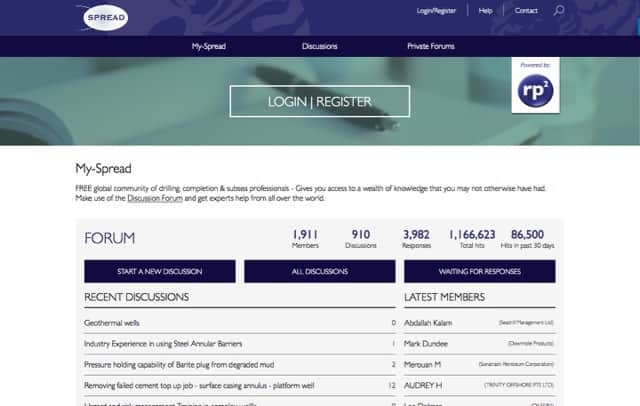
If Oilpro is LinkedIn for the oil industry, then perhaps my-spread.com is the equivalent of Quora. Quora.com is an open forum where it is free to sign up and create a profile. Then you can post questions and answers on any topic in the world. People who spend time there are motivated by being helped, and being helpful. This knowledge ‘gift exchange’ forum is user-generated, and people do it for genuine reasons.
For those who’ve not used Quora.com, it is like Yahoo answers but on a much higher level. The quality control is high, and spam and irrelevance get minimised. It’s information sharing in its purest form. You can check the profile of the person replying to see how experienced or knowledgeable they are. You can see if they’re qualified enough to answer your question.
My-Spread.com is the leading problem-solving forum for the oil industry. While it gets geared towards engineers, geologists and drilling managers, topics from any planning or operational side of the industry are there.
My-Spread is a no-nonsense, efficient problem-solving machine to which there is no other comparison on the web. Every single new member and organisation is personally reviewed and vetted by more than one moderator. Each question, answer or comment gets emailed to the site owners and managers who will edit or weed out anything unsuitable right away. Then these updates go out on a daily email alert to almost 2000 high-level technical problem solvers.
It’s a bit like an ‘almost live’ radio show that gets aired shortly after recording. It is hot-off-the-press but pre-moderated for relevancy and quality.
Because of the quality control and efficiency built into the system, you as a user will experience minimum friction in the process. If you post a question, you will see in the daily update the person has answered it. You only need to log into the site if you physically want to search for or type something.
This ease of use is a boon to you while you are working on-site. If you can check your email, you can get the answer to your question. There’s no need to go to the website to look at responses.
Conclusion: the best oil and gas forums now
If you’re not already using Oilpro and My-Spread, then check them out. We all probably spend a bit too much time online. Have you ever gone onto Facebook for five minutes and found yourself looking at junk 30 minutes later? Have you ever logged off and felt that your time had gotten wasted? This feeling is unlikely to happen when you use either of these two oil and gas forums. If by chance you log on and don’t find anything substantial that day, you can still be happy that you didn’t miss anything. If something important is happening, or if technical problems can be solved, this will be happening on Oilpro (Oilprice or NatResPro) and My-spread.
Disclosure: My-spread.com is a client of Out of the Box Innovations. This review was not solicited by, or paid for by the owners of my-spread.com. OOTBI has no commercial relationship with Oilpro. This article got based on the opinion of the writer, and the words would be the same regardless of any client relationship.








